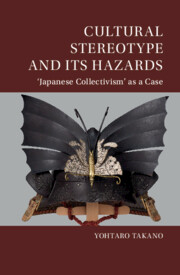Book contents
- Cultural Stereotype and Its Hazards
- Culture and Psychology
- Cultural Stereotype and Its Hazards
- Copyright page
- Contents
- Figures
- Tables
- Preface
- Acknowledgments
- Chapter 1 “Japanese Collectivism”
- Chapter 2 Psychological Studies
- Chapter 3 Japanese Culture in Real Life
- Chapter 4 Japanese Economy
- Chapter 5 Origins of “Japanese Collectivism”
- Chapter 6 Cultural Stereotype
- Chapter 7 Hazard
- Afterword
- Appendix
- References
- Index
Chapter 7 - Hazard
Published online by Cambridge University Press: 21 November 2024
- Cultural Stereotype and Its Hazards
- Culture and Psychology
- Cultural Stereotype and Its Hazards
- Copyright page
- Contents
- Figures
- Tables
- Preface
- Acknowledgments
- Chapter 1 “Japanese Collectivism”
- Chapter 2 Psychological Studies
- Chapter 3 Japanese Culture in Real Life
- Chapter 4 Japanese Economy
- Chapter 5 Origins of “Japanese Collectivism”
- Chapter 6 Cultural Stereotype
- Chapter 7 Hazard
- Afterword
- Appendix
- References
- Index
Summary
This chapter reveals how hazardous a cultural stereotype could be by reviewing the U.S.-Japan trade friction. A cultural stereotype is typically formed by another culture and tends to attach negative value to the target culture. The preconception of “Japanese collectivism” created an image that Japanese economy must be a collective economy, which was ungrounded as shown in Chapter 4. When Americans faced a large trade deficit against Japan, this image caused fury at Japan’s “collective economy” among Americans who had individualism ideology and aversion to collectivism. The alleged collective economy of Japan justified severe trade restrictions against Japanese products and interference in domestic affairs of Japan, which caused collapse of major industries and finacial meltdown in Japan followed by stagnancy of Japanese economy. Cultural stereotypes brought even more serious disasters in Yugoslavia and Rwanda. It is necessary to understand the properties of cultural stereotype in order to prevent it from exacerbating possible inter-group conflicts in the near future due to such global phenomena as population increase and global warming.
Keywords
Information
- Type
- Chapter
- Information
- Cultural Stereotype and Its Hazards‘Japanese Collectivism' as a Case, pp. 218 - 240Publisher: Cambridge University PressPrint publication year: 2024
